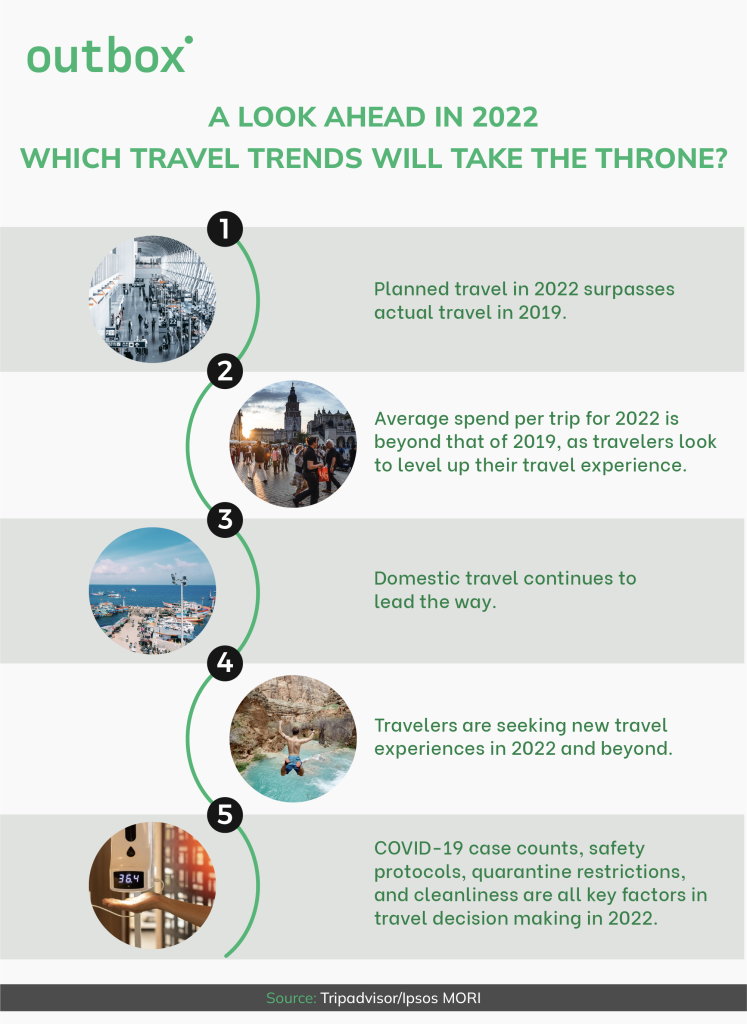For millions, the COVID-19 pandemic has brought to light just how important the simple act of traveling is and how much enrichment it brings to life. The world continues to feel the effects of COVID-19 with new variants, but people across the globe are still finding ways to safely get back out there and explore the world.
A new travel trends research paper released by Tripadvisor reveals how consumers are planning to travel in 2022 and beyond, and how their attitudes and behaviors in relation to travel have changed as compared to pre-pandemic. While outside factors like Covid-19 variants, international travel rules and staffing shortages still can represent existential threats to traveler behaviors, year-end sentiment and search data show ongoing demand for travel remains high. However, who benefits from the tourism demand? As travelers spend more, cultural experience providers (tours and attractions), tourism businesses catering to domestic audiences and companies adhering to safety standards will win the hearts and minds of travelers.
‘Travel in 2022 – A Look Ahead’ combines consumer sentiment analysis via surveys in five major international markets (United States, United Kingdom, Australia, Singapore and Japan), and behavioral analysis of Tripadvisor’s first-party search data – uncovering several travel patterns, such as the average length of trip planned for 2022 and the amount travelers are looking to spend.

1. Planned travel in 2022 surpasses actual travel in 2019
Across the five key markets around the world that were surveyed, those likely to travel for leisure purposes in 2022 outpaces pre-pandemic reported travel levels.
In the UK, 78% of respondents said that they are likely to travel for leisure in 2022, compared to 72% of those who said that they traveled for leisure in 2019.
In the United States, 2022 leisure travel intent is up 8 percentage points (pp) compared to 2019, with 71% saying they are likely to travel for leisure in 2022.
Singapore leads the way in travel optimism, with 82% reporting they are likely to vacation in 2022, up 2pp compared to 2019. Australia (72%) and Japan (51%) are trending similarly, with those who are planning a leisure trip in 2022 up 7pp and 5pp from those who reported traveling in 2019, respectively.
2. Average spend per trip for 2022 is beyond that of 2019, as travelers look to level up their travel experience
According to Tripadvisor site behavioral data, American travelers are expected to spend 29% more on their average trip in 2022 than they did in 2019.
In Australia, average booking rates are expected to be up by 16% in 2022 against 2019.
Singaporean travelers booking values are also expected to increase by an average of 7%.
On the other end of the spectrum, the average Japanese traveler is expecting to spend 30% less in 2022 compared with 2019. While in the UK, Brits are planning to spend slightly less on 2022 travel than they did in 2019 (-1%).
The biggest shift comes from visitors’ perception of spending per trip. Over a quarter of travelers in each of the five markets surveyed said it is more important now than before the pandemic to splurge on a big trip. In the United States, roughly 3 in 10 Americans (29%) who traveled for leisure in 2019 said it’s more important now than before the pandemic to splurge on a big trip. Twenty-eight percent of Singaporean and Australian travelers, 27% of Japanese travelers and 25% of UK travelers said the same.
3. Domestic travel continues to lead the way
While a sizable proportion of consumers across most of the markets surveyed plan to travel abroad for leisure in 2022, traveling within their home country is still the most favored option.
Seventy-four percent of Singaporean respondents plan to travel domestically for leisure, compared with 53% who plan to travel abroad for leisure. Seventy-three percent of Brits say they plan to travel within the UK for leisure compared with 48% planning to travel abroad.
In the US and in Australia, 68% of respondents in each market said they are likely to travel domestically in 2022, while 29% of Americans said they are likely to travel overseas in 2022 compared to 38% of Australians.
In Japan, 50% of Japanese respondents reported that they are likely to travel within their home country in 2022, compared to 10% of those likely to travel internationally.
4. Travelers are seeking new travel experiences in 2022 and beyond
More than a third to nearly half of all travelers surveyed in the United States (41%), UK (38%), Australia (46%), Japan (34%) and Singapore (49%) said that traveling to a destination they’ve never been to before would be more important to them now, compared to trips they took in 2019, when choosing where to travel.
Three-quarters (75%) of Americans said that it’s important they “see new places” when thinking about their future travel plans, 74% of Australians, 73% of Singaporeans, 70% of Britons and over half (59%) in Japan said the same.
The top three most important considerations, across the markets surveyed, in future travel plans to visit a destination was to get immersive by seeing new places, having new experiences and learning about history and culture.
Forty-four percent of Singaporean travelers, 38% of Australians and a third (34%) of Americans and UK travelers respectively said that it’s more important now than before the pandemic that they choose a destination where they can immerse themselves in “authentic local experiences”. A quarter (25%) of Japanese travelers said the same.
In both the US and Australia, 30% of travelers said it’s more important now that they “pack as many activities” into their holiday travel as possible. While in the UK, 28% said it’s more important for them to plan an action-packed travel experience in 2022 or beyond.
5. COVID-19 case counts, safety protocols, quarantine restrictions, and cleanliness are all key factors in travel decision making in 2022
Eighty-five percent of Singaporean travelers, nearly three-quarters of Japanese (73%) and Australian (74%) travelers, 72% of British and 70% of Americans say that cleanliness measures of a hospitality business will be an important factor in their travel decision making next year, even after COVID-19 cases have dropped worldwide.
But while travel precautions and restrictions are factors many travelers want to avoid, personal safety concerns post-pandemic remain alive and well. Approximately 7 in 10 respondents in each of the markets said that destinations that have a low number of COVID-19 cases are important when making a decision on where to travel next.
One-third of the Brits (32%) and Americans (33%) who aren’t traveling next year said they’ve decided against it because of uncertainty surrounding possible travel restrictions. Over half (55%) of Singaporeans, 47% of Australians and a quarter (25%) of Japanese respondents cited the same reason.
The survey results show that in every country, having the ability to travel to another destination without needing to self-isolate both upon arriving at their destination and after returning home is considered important by the majority of respondents when making decisions about their next travel destinations.
Source: TripAdvisor



